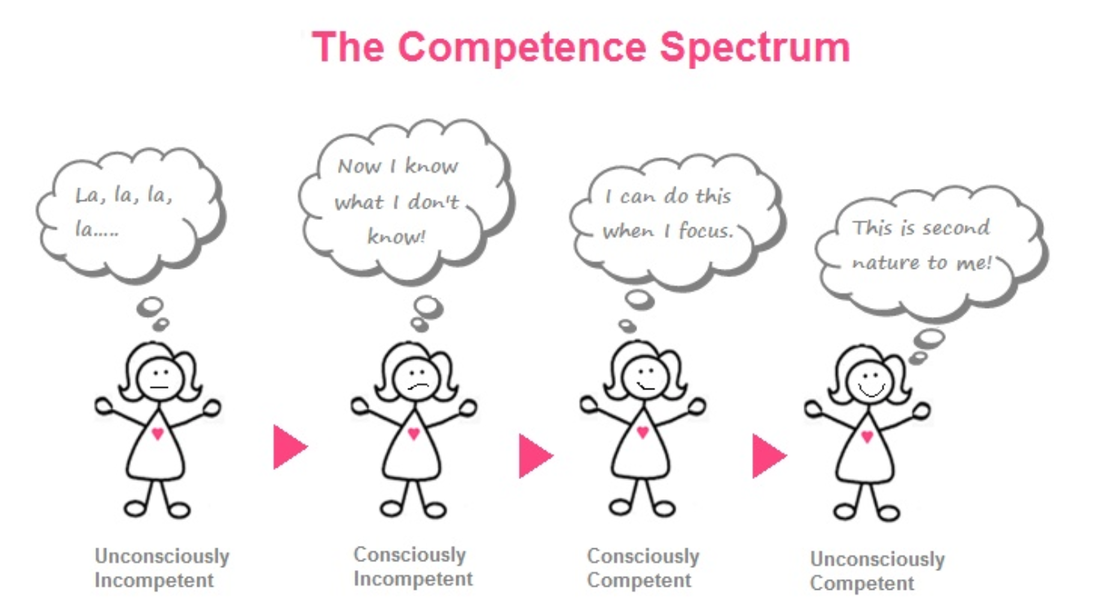|
2/10/2015 1 Comment Mindfulness and the Brain Mindfulness increases concentration and focus. With mindfulness you know when you’re drifting off, resorting to an old habit, thinking of the grocery list. You notice, bring your focus back and continue on with the task at hand. Mindfulness works hand in hand with building Myelin - the casing or insulator that surrounds and wraps the neural circuit which grows, much like the rings on the trunk of a tree, in response to certain signals. Building myelin is essential in our practice, teaching and performing. The more we build up, the faster and more accurate our thoughts and movements become. Deep practice (myelinating) is hard: we start with embracing the struggle - in small workable sections...detecting errors, fixing them - without judgement, just observation...its clumsy and frustrating - we’re reaching and riding on the edge of what we can do. It is “a discomfiting sensation that any sensible person would instinctively avoid....we permit ourselves to fail, which will increase myelin and in turn our skill will increase....be willing, or even enthusiastic about being bad.” The Talent Code" by Daniel Coyle Myelin develops with “precision firing”. We develop a working perception of the skills internal blueprints - growing a detailed understanding which allow us to control and adapt our performance, to fix problems and to customize our circuits to new situations. We find the discipline to repeat this fragile circuit over and over until the myelin has built up and that skill is now once again a part of our unconscious. When we first start, we’re working at 2 miles/hr - when we’ve built up enough myelin for the skill to to go back to unconscious, its working at 200 mi/hr! We’ve increased our information processing capacity 3000 times. According to “The Talent Code”, we must also “feel it” in order to help the wiring fire and to build myelin. Descriptors such as Attention, Connection and Awareness are used. If one practices Mindfulness - to be “aware” is a given. Our Deep Practice takes on a life of its own, much like Mindfulness - we start out not liking it, then we can tolerate it, then we enjoy it. Conversations become more intense - a shift in reverence for warm ups and rituals may be observed as well.
1 Comment
2/2/2015 1 Comment Concentration ExercisesFrom "Meditation Operation"
Left to its own whims, the mind is akin to a wild animal—given to succumb to its natural urges for exploration. It tends to jump from one thought to another, and will often resist your attempts at making it “behave” in one corner. And in this day and age of the internet and video games, the effects of various stimuli on our mental state can even be worse—that’s why people these days have so brief attention spans. You can overcome this sad state of affairs by performing these simple yet highly effective concentration exercises at least once a day. 1. Count backwards Find a comfortable spot where no one can disturb you and start mentally counting from 100 to 1. Feel free to increase that number—500, 1000—depending on what you feel you’re capable of doing. 2. Count backwards: with variations This is similar to the first one, but in this case, you can vary the count by skipping numbers. For instance, you can skip by threes (100, 97, 94 and so on) or by fives (100, 95, 90 and so on). The additional mental load of calculating the numbers as you skip can further increase the intensity of the concentration required to keep the numbers right. 3. Count words As far as effective concentration exercises go, this particular mental activity is highly effective in sharpening your mental focus. Get any book—a novel or a school textbook—and try counting the words in any single paragraph. When you get better, start upping the ante: count the words on an entire page, then two pages, then five pages, then finally, count the words in an entire chapter. Take note that you must do the counting entirely mentally and using only your eyes—do not use your finger in pointing at each word. 4. Observe Get any physical object—a fruit, a small furniture, a toy—and examine it closely and carefully. Take note of its characteristics and features while keeping your mind from straying away and starting to entertain other thoughts—keep your complete attention on the thing you currently have in your hands. Take note of its color, shape, texture, even the smell. 5. Focus on a single word Find a nice quiet spot where you can stay for at least five minutes without anyone interrupting you. As in the previous concentration exercises, this also requires you to laser-point your thoughts on a single target—this time, a single word of your choice. It doesn’t matter what word as long as it’s inspiring. “Love,” “courage” “happiness,” or “success” are good examples. Repeat the word mentally in your mind for five minutes. When you feel your concentration is improving, you can increase the duration to 10 minutes. 6. Observe without thinking This exercise is similar to (4), but this time, you will observe any chosen object (fruit, furniture, kitchen utensil) without any mental verbalization. That is, make the act of observing completely blank as much as possible. Basically, for five or so minutes, you should look at your chosen object from all sides and angles without thinking anything about it. 7. Observe and conjure This is the logical next step to steps 4 and 6: this time, after observing your chosen object for a few minutes, close your eyes and mentally picture the object as you’ve seen it. Visualize it by “examining” the object mentally: turn it around in your mind and take note of its features and physical characteristics while shutting out any irrelevant or stray thought. Improving your concentration and sharpening your mental focus through the aforementioned concentration exercises can bring about countless benefits to your life, career and health. Better concentration, for instance, can significantly improve the power of your meditation sessions. When you meditate to eliminate stress from your life, attract success or simply achieve better health, your enhanced power of concentration will not only make your meditations much more focused, but also easier to perform as well. |
GwenI am presenting my observations, trials, failures and insights from decades of inquiry, experience and from a place of humility, openness and non-judgement....I wish to facilitate discussion. Archives
September 2015
Categories |

 RSS Feed
RSS Feed
